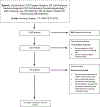Assessment and Treatment of Behavioral Disorders in Children with Hearing Loss: A Systematic Review
- PMID: 30200810
- PMCID: PMC6441325
- DOI: 10.1177/0194599818797598
Assessment and Treatment of Behavioral Disorders in Children with Hearing Loss: A Systematic Review
Abstract
Objective: There is evidence that children who are deaf and hard of hearing (DHH) have a higher incidence of behavioral disorders. Assessment of behavioral health in this population is often complicated by language developmental delays, which may result in unrecognized and untreated behavioral problems. The purpose of this study is to assess the association of behavioral disorders among children who are DHH and to explore behavioral interventions for children in this population.
Data sources: PubMed, CINALH, PsychINFO, and Web of Science.
Review methods: Search terms included the following: problem behavior, child behavior disorders/diagnosis, child behavior disorders/psychology coupled with hearing loss, cochlear implants, hearing aids, or deafness. Studies from the last 30 years (1985-2016) were included. The articles were reviewed independently by 3 reviewers.
Results: Thirty-six articles met criteria. There was an association between internalizing behaviors and hearing loss among children, which may persist after cochlear implantation. These problems may be more pronounced for children with additional disabilities. Conduct and hyperactivity disorders as well as emotional and executive function problems among children who are DHH may be related to poor language development. There was limited evidence regarding interventions to address the behavioral disorders of DHH children.
Conclusions: There is a significant body of evidence demonstrating behavioral problems among DHH children but a lack of clear understanding of the mechanisms involved. There is limited evidence on interventions to address the behavioral problems of DHH children. Future research is warranted to mitigate the long-term effects of disruptive behavior among these children.
Keywords: behavioral disorders; cochlear implants; hearing loss; systematic review.
Figures
References
-
- World Health Organization. Deafness and Hearing Loss. http://www.who.int/mediacentre/factsheets/fs300/en/. Accessed February 14, 2018.
-
- Hindley PA, Hill PD, McGuigan S, Kitson N. Psychiatric disorder in deaf and hearing impaired children and young people: a prevalence study. J Child Psychol Psychiatry. 1994;35(5):917–934. - PubMed
-
- Perou R, Bitsko RH, Blumberg SJ, et al. Mental health surveillance among children--United States, 2005–2011. MMWR Suppl. 2013;62(2):1–35. - PubMed
-
- Moffitt T. Adolescence-limited and life-course-persistent antisocial behavior: A developmental taxonomy. Psychological Review. 1994;100:674–701. - PubMed
-
- Patterson GRDB, Ramsey E. A developmental perspective on antisocial behavior. American Psychologist. 1989;44:329–335. - PubMed
Publication types
MeSH terms
Grants and funding
LinkOut - more resources
Full Text Sources
Other Literature Sources
Medical
Miscellaneous


